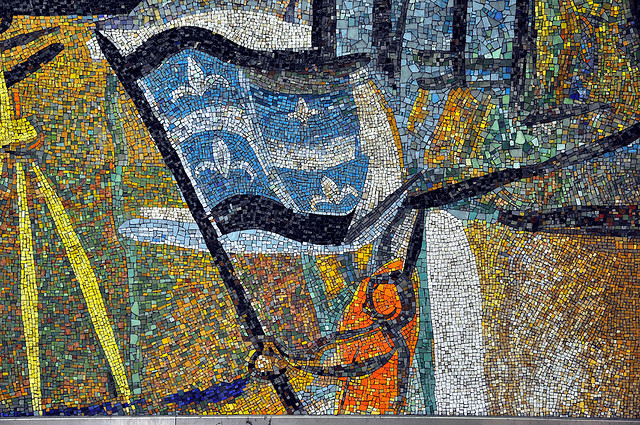“I did not leave a country where I was told I had to wear a headscarf, to come to a country and be told I could not wear one” (Radio-Canada clip, after 5-minute mark).
The proposed Charter of Values released by the Parti Québécois government was an instant subject of controversy within Quebec and across Canada, but for widely different reasons.
The Charter has provoked a round of Quebec bashing in the Anglo-Canadian mainstream media. Some critics suggest it was designed to do just that, since making Quebec a target for ire helps alienate Francophone Quebec from the rest of Canada, furthering the sovereignist objectives of the PQ.
At it turns out, given an opportunity to attack simultaneously Quebec, a female premier, and a political party favouring independence that also forms the government, right-wing pundits from the Sun and CanWest Global chains were not to be denied.
Quebec progressives have been organizing opposition, publishing manifestos, collecting signatures, and producing analysis for the daily press denouncing injustices visited on religious minorities, most specifically Muslim women. Le Devoir journalist Isabelle Porter reported that many women with headscarves found employment in childcare centres, and their jobs would be in jeopardy if the Charter was applied.
Much attention has been given to the Charter proposal to ban the wearing of religious symbols by public servants, whether it be a headscarf, a turban or a yarmulka, or ornaments such as a large cross. This proposal has been rejected by the three opposition parties. With the PQ in a minority situation, the discriminatory measure will not win majority support in the Quebec National Assembly.
Quebec Liberal leader Philippe Couillard wants nothing to do with the PQ Charter, stating it creates unnecessary controversy when Quebec needs to focus on economic issues. The very progressive Québec Solidaire points out the bulk of the Charter proposal is non-controversial. It affirms Quebec to be a secular society. It says on religious questions, the State needs to be neutral. It wants signposts to be established for accommodating religious practices and civic life. For instance, people requesting a driver’s licence need to be photographed without their faces covered.
The populist Coalition for Quebec’s Future (CAQ in French) would allow religious symbols to be worn by public servants, except among people in authority: police officers and judges. This was the position taken by the Bouchard Taylor commission that investigated the question of how religious differences could be accommodated in a reasonable manner in Quebec.
By accepting the CAQ proposal, the PQ could presumably negotiate its support, and the Charter of Values would be adopted. If the PQ sticks to proposing a Charter that will fail to be adopted by the National Assembly, this suggests another scenario: the party is using its charter as a wedge to divide and marginalize opposition to the government, before an election.
On her blog, leading political analyst Josée Legault linked the Charter proposal to a shift in political strategy by the PQ. Instead of pursuing sovereignty, Marois has been persuaded by Jean-François Lisée, an influential adviser and Minister, to focus on “identity politics.” Champion Quebec values to win the battle with the right-of-centre CAQ outside Montreal, and marginalize the Quebec Liberal party in Francophone Quebec, as a step towards winning a majority in the next election. Opposition by the federal government and political parties in Ottawa to the PQ charter offers an opportunity for a second wedge to be driven between Quebec and Canada outside Quebec, allowing sovereignty to be actively pursued.
Premier Pauline Marois has said the Values Charter is designed to take its place alongside the Charter of the French Language (Bill 101) as a foundational statement about Quebec society. As proposed, it is hard to see this to be the case.
The Quebec Charter of Rights (1975) asserts religious freedoms, the equality of men and women, and other fundamental political and civic rights. The Charter of Values adds little to what is already enshrined in law. What is missing, however, from both the Canadian Charter of Rights (1982) and the Quebec Charter, are economic and social rights.
The right to housing, a job, education, health care, recreation, cultural enrichment, are part of the UN Convention on Economic, Social, and Cultural Rights, signed by Canada in 1966, but never replicated in a constitutionally binding charter.
If it were to adopt an economic, social and cultural rights charter, the PQ would bring a direct challenge to Conservative Ottawa. With Stephen Harper as an adversary, the PQ could have a field day blaming federalism for its inability to enact the charter provisions, and calling on Ottawa to provide it with the means to enact its charter ideals. But it would mean asserting social democratic principles and neglecting its conservative nationalist wing.
Quebec has a history of religious tolerance that can be traced back to the foundation of New France by Henri IV in the wake of the religious wars in France. At the start of the 17th century, Henri IV who had previously proclaimed the Edict of Nantes, designed to end religious conflict, and he charged Samuel Champlain to establish a settlement in New France where Catholics and Protestants could live side by side.
That is the tradition worth celebrating and promoting in Quebec today.
Duncan Cameron is the president of rabble.ca and writes a weekly column on politics and current affairs.
Photo: caribb/flickr



